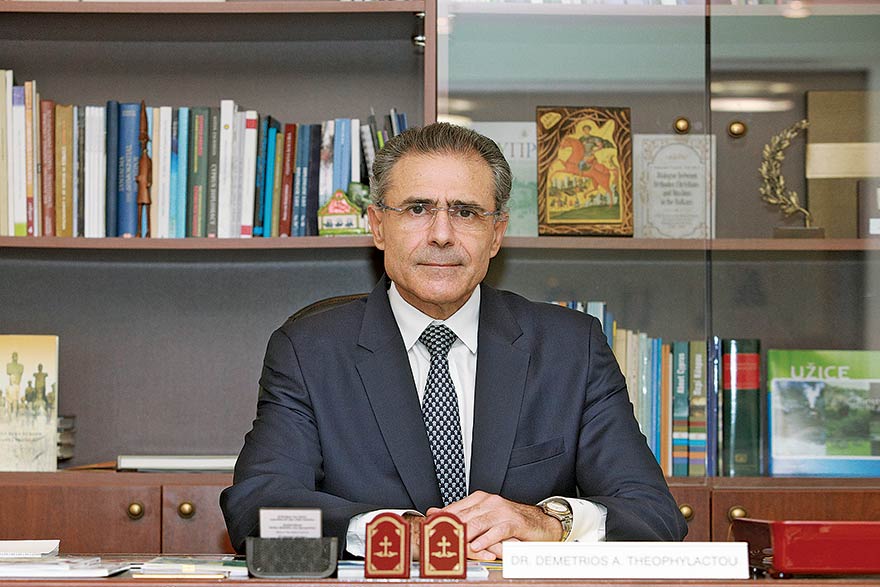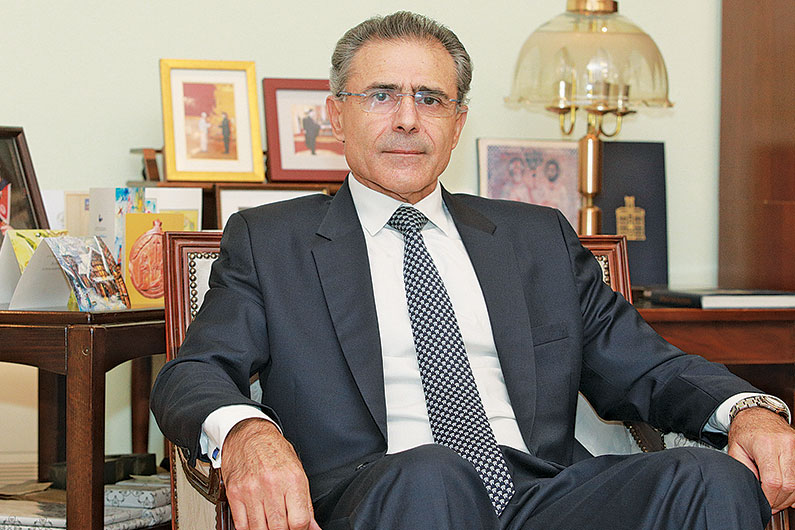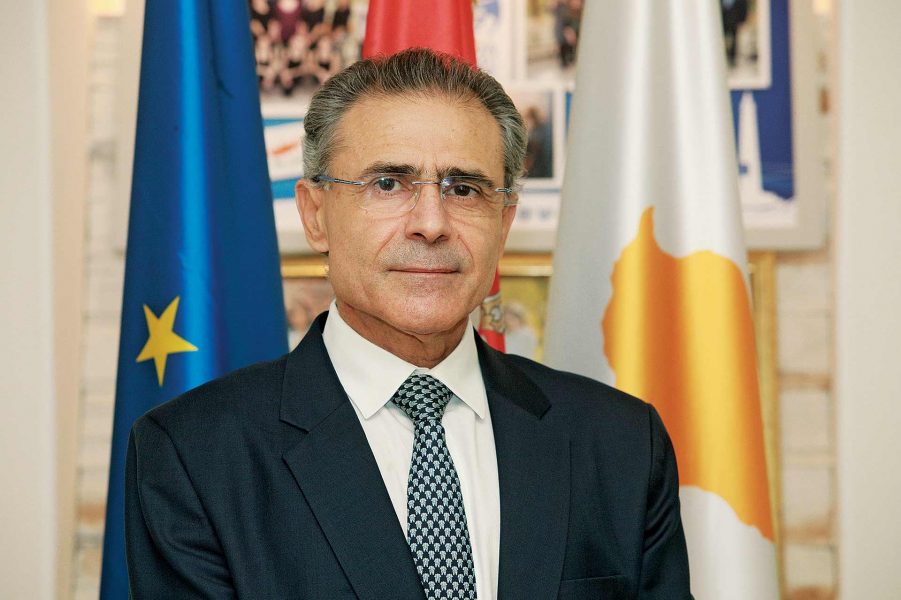|
DEMETRIOS A. THEOPHYLACTOU
2020- Ambassador of the Republic of Cyprus to the Republic of Serbia (11.12.20)
2018-2020 Ministry of Foreign Affairs – Division of Political Affairs Head of Department,
Development Cooperation & Humanitarian Aid
2015-2018 High Commissioner of the Republic of Cyprus to India (accredited to Nepal, Bangladesh, Myanmar, Thailand, Malaysia, Vietnam, Sri Lanka and Maldives)
ASEF Governor for Cyprus
2014-2015 Ministry of Foreign Affairs – Division of Political Affairs Dep. Head of Department, Asia & Oceania
2013-2014 Permanent Representation of Cyprus to the EU Deputy Political and Security Committee Representative Civilian Crisis Management Committee Representative
2013 Ministry of Foreign Affairs – Schengen & Consular Affairs Head of Schengen Department
2012-2013 Permanent Representation of Cyprus to the EU
Cyprus Presidency of the Council of the EU (July – Dec 2012)
Chair, Development Cooperation Committee
Chair, Humanitarian Aid & Food Aid Committee
2010-2011 European Commission – Officer, International Relations
International Coordination, Americas (USA, Canada Desk)
2009-2012 Ministry of Foreign Affairs – Division of European Affairs
Dep. Head of Department, Development Cooperation,
Humanitarian Aid & International Economic Organizations
2006-2009 European Commission – Seconded National Expert (SNE)
International Affairs & Enlargement (ENP)
D.G. Employment, Social Affairs & Equal Opportunities
2004-2006 Permanent Representation of Cyprus to the EU
Political and Security Committee / Civilian Crisis Management
2002-2004 Ministry of Foreign Affairs – Division of Political Affairs
Transatlantic Relations
2001 - 2002 High Commission of Cyprus to Australia – Canberra
Political Section, Press Counsellor
1994 - 2001 Permanent Mission of Cyprus to the UN – New York
Press Counsellor / Delegate, UN General Assembly
Education Senior Associate Member – University of Oxford
Post Doctoral Fellow – Harvard University
PhD International Relations / Masters in Communication Washington State University
Visiting Professor – Boston University
Languages Greek, English, French (fluent) / Italian, Spanish, Turkish (proficient)
H.E. Demetrios Theophylactou, Ambassador Of Cyprus To Serbia and as of 02 June 2021 to the Republic of North Macedonia
International Law Vs. The Law Of The Jungle
There are certain issues of vital national interest on which Cyprus cannot – and shall not – succumb to any pressure. Cyprus is not the only EU member state that does not recognise Kosovo. This is not an issue of harmonisation. The territorial integrity of Serbia, much like the territorial integrity of Cyprus, is a matter of principle and international legality, and is therefore of vital national interest – H.E. Demetrios Theophylactou
The new Cypriot ambassador is enthusiastic about starting his term in Serbia, despite that happening during difficult times. His plan is to strengthen bilateral cooperation in various sectors, including defence, education and science, economy and tourism. In this interview for CorD Magazine, Ambassador Demetrios Theophylactou explains why Cyprus has not accepted the occupation of part of its territory, for almost half a century, and why the Government in Nicosia does not accept the unilaterally declared independence of Kosovo. He says that he doesn’t believe recognition of Kosovo’s independence could be set as a condition of Serbia’s EU accession.
Your Excellency, given that you are just starting you term in Serbia, what have you set as your priorities?
At the outset, I would like to underline that it is a privilege to serve as Ambassador of the Republic of Cyprus to the Republic of Serbia. Clearly, I will do my very best to further strengthen our excellent level of bilateral cooperation, based on shared values and cultural ties. Moreover, I will work closely with the Government of Serbia, also in the context of our participation in the European Union (EU), to further promote cooperation in multilateral organisations. As for priorities, those include security and defence, cybersecurity, education, economic cooperation and scientific research, including IT applications in energy, climate change and biomedical engineering. There is also scope to promote tourism: business, medical, sports and cultural tourism.
Our countries have remarkable people in Letters and Arts who can create beautiful joint projects. In ecclesiastical art, there is great potential for studying and exchanging expertise between scientists and art historians. This will broaden our knowledge of our Orthodox religion. Multiculturalism is also of particular interest, due to various influences that have left their mark on Serbia and Cyprus. The ultimate objective is to strengthen the traditional ties between our peoples.

Your arrival in Belgrade coincided with the visit of Serbia’s Foreign Minister to Cyprus, with Minister Selaković having emphasised that this was his first visit to a foreign country in his capacity as foreign minister. What can you say about the impact of this visit from the perspective of Cypriot officials?
We are particularly pleased that Foreign Minister Selaković chose Cyprus for his first official bilateral visit. This reflects the mutual respect, understanding and solidarity that has developed between Belgrade and Nicosia over the years.
The visit provided a good opportunity to reaffirm and reiterate our common positions on a number of issues. We expressed gratitude for Serbia’s consistent and principled support to Cyprus, particularly in regard to a just and viable settlement of the Cyprus problem, respecting our territorial integrity and sovereignty. Cyprus’s positions of principle on the non-recognition of Kosovo had been clearly stated. It was also an opportunity to assess Serbia’s accession course to the EU, for which Belgrade enjoys the full support of Cyprus. Nicosia welcomed the progress achieved so far on reforms and strongly advocated for this to be commended in European Council Conclusions.
Recognition of progress and the opening of new chapters constitute strong incentives for candidate states to continue their reform agenda. In brief, the visit had a symbolic significance and a substantive value, as it fine-tuned our positions on significant bilateral, regional and multilateral issues.
I will work closely with the Government of Serbia, also in the context of our participation in the European Union, to further promote our cooperation in multilateral organisations
When could the idea of a tripartite meeting between officials of Cyprus, Greece and Serbia be implemented and what is the potential of this cooperation?
Once the conditions regarding the pandemic allow, we are eager to establish a trilateral cooperation mechanism. Indeed, we are ready to convene this mechanism, on the basis of decisions taken at the Intergovernmental Commission of 2018. We consider Serbia as a natural extension of the network of regional multilateralism. We can advance a specific agenda with added value on connectivity, sustainability, entrepreneurship and crisis management coordination. We also look forward to putting into effect the Memorandum of Understanding on Diaspora cooperation and identify specific actions.
Cyprus is among the EU member states that decided not to close borders to Serbian citizens who require a negative coronavirus test in order to travel. How has this stance reflected on the number of visitors to Cyprus from Serbia?
The pandemic had a significant impact on travel and tourism. This has inevitably influenced the movement of travellers from Serbia, and vice versa. Serbia was placed in the second category and later in the third category of high-risk countries, based on epidemiological data. In 2020, we had about 2,600 arrivals for the purposes of repatriation, business, sports or pleasure. However, we believe that the number of visitors will increase substantially in 2021. Direct flights from Belgrade make it a good hub for business and special interest tourism, where more emphasis will be placed from now on.

Serbian officials have repeated their gratitude to Cyprus for supporting the country’s struggle to preserve its territorial integrity. How does Cyprus view the oft repeated calls of colleagues from the EU suggesting that you should harmonise your stance on the independence of Kosovo with that of the majority of the Union?
There are certain issues of vital national interest on which Cyprus cannot – and shall not – succumb to any pressure. Cyprus is not the only EU member state that does not recognise Kosovo. This is not an issue of harmonisation. The territorial integrity of Serbia, much like the territorial integrity of Cyprus, is a matter of principle and international legality, and is therefore of vital national interest. Subsequently, we shall continue to reiterate our stance on the non-recognition of Kosovo.
Given that you are very familiar with the situation in the EU, do you believe that Serbia will be asked to recognise the independence of Kosovo as a condition of EU accession?
This scenario is unlikely, if only because a number of EU member states would object to it strongly. Accession negotiations take place within a set of policy areas, or Chapters, on which progress ultimately determines the outcome of negotiations, based on specific criteria. The Chapters of the Acquis, 35 in total, form the basis of accession negotiations. Certain reforms are necessary to meet the accession criteria. Candidate countries are required to harmonise their national legislation with EU legislation. There is no question of conditions associated with Serbia’s EU accession.
Candidate countries are required to harmonise their national legislation with EU legislation. There is no question of conditions associated with Serbia’s EU accession
Serbia didn’t make any progress on the road to EU integration during 2020, while North Macedonia and Albania didn’t see the long-awaited launch of their own membership negotiations. Do you consider that a true willingness for expansion to encompass the Western Balkans currently exists in the EU?
Due to various developments, both within the EU and globally, including the protracted financial crisis that was further exacerbated by the pandemic, EU enlargement has shown signs of ‘fatigue’.
This is not to say, however, that there is a lack of willingness to continue enlargement with Serbia or the Western Balkans. It is simply a matter of managing internal and external contingencies, which inevitably impinge upon the pace and scope of enlargement. Notwithstanding that, the process envisaging the accession of Serbia and the Western Balkans continues unabated.
Cyprus faced new problems connected to its own sovereignty during 2020. Do solutions exist to the dispute over the ownership of sources of gas in Cyprus’s waters that Turkey also claims the right to exploit?
Indeed, in 2020 Turkey intensified its illegal actions against Cyprus, in full defiance of international law and with utter contempt for the EU’s efforts to keep the door to dialogue open. Ankara’s actions and aggressive public discourse have further exacerbated tensions in Cyprus and Greece, increasing instability in the Mediterranean – and beyond. This aggressive behaviour is effectively poisoning the climate, undermining any efforts towards de-escalation.
As for natural resources within the Exclusive Economic Zone of Cyprus, Turkey is currently performing its 12th consecutive illegal seismic survey over the course of the past 18 months, after carrying out six illegal drilling operations within our maritime zone, which is delimited in accordance with international law. The offshore exploration blocks have been duly licensed to international and European energy companies by the Republic of Cyprus. Ankara also continues its provocations against Greece, announcing yet another illegal seismic survey in Greece’s continental shelf, despite efforts to create a climate conducive to dialogue.

Are you satisfied with the EU’s response of imposing sanctions on Turkey for its “unauthorised activities” in the Cypriot coastal region?
One can appreciate that, for a small country like Cyprus, the only means at our disposal to protect ourselves are in the upholding of international law. Therefore, in an environment where others wish to impose the law of the jungle, international legality is of an existential nature to us. This is a point that Serbia fully shares with Cyprus. In November 2020, the EU renewed its sanctions regime against Turkey in response to escalating violations of international law. Belgrade aligned itself with this decision. Clearly, Ankara’s illegal actions constitute a direct threat to our integrity and sovereign rights. Further sanctions should be imposed, given the gravity of the noted violations. Certain EU member states are hesitant to consent, for their own reasons.
It is instructive for your readers to know that Protocol 10 of the Accession Treaty of Cyprus to the EU provides that “the Republic of Cyprus enters the EU as a whole and that the Acquis is suspended in the occupied area”
UN Secretary General Antonio Guterres has assessed that the time has come to resume talks on the reunification of Cyprus.Do you believe that talks leading to a final solution are possible at this juncture?
The President of the Republic of Cyprus, Mr Nicos Anastasiades, has reiterated our commitment to resume negotiations on the agreed basis achieved in 2017, after the last round of talks in Crans- Montana, Switzerland. Indeed, the UN Secretary General plans to convene an informal meeting in New York, in late February, with the participation of Greece, Turkey and the United Kingdom, in order to assess prospects for the resumption of negotiations.
However, repeated statements by Ankara and the leadership of the Turkish Cypriot community directly questioning the agreed basis and openly advocating a “two state” solution are not conducive to meaningful negotiations with realistic prospects for success.
The occupation of part of the territory of Cyprus began almost half a century ago. It would probably be interesting for readers in Serbia to hear why no Cypriot government has ever considered giving up the fight for the northern part of Cyprus, which you still refer to as the occupied territory?
Turkey aims at imposing the permanent division of Cyprus, through a “two-state” solution. Turkey’s illegal occupation, in violation of international law, has been condemned by the UN and other international bodies. No Government of the Republic of Cyprus will ever give up on our sovereign rights. It is instructive for your readers to know that Protocol 10 of the Accession Treaty of Cyprus to the EU provides that “the Republic of Cyprus enters the EU as a whole and that the Acquis is suspended in the occupied area”.
It is clear that the Acquis is suspended in the northern Turkish occupied part of the island. In short, Protocol 10 of the Accession Treaty envisages “the suspension of the Acquis in the areas of the country that are not under the effective control of the Government of Cyprus”. Moreover, Turkey’s refusal to abide by the obligation to execute judgements of the European Court of Human Rights related to Cyprus, especially the 4th Interstate case of Cyprus vs. Turkey, cannot be tolerated. We are grateful that Serbia sees eye-to-eye with us on this matter.
|